Arts & Entertainment
Your Daily Guide to Outfest 2018: July 14
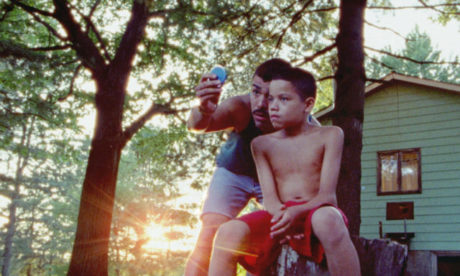

“The Gospel of Eureka,” photo courtesy Outfest.
Outfest is a great experience for LA film fans, but it can be a little intimidating. With so many films and events to choose from, it can be difficult to even know where to start. That’s why the Los Angeles Blade is here to break it all down for you, on a daily basis.
For the duration of the festival, we’ll be posting a daily roundup here with a brief look at the selections of the day. Whether you’re a hard-core movie buff who plans to see as many screenings as possible, or a casual moviegoer looking for a date night treat, we’ve got you covered!
Just take a look at the offerings of the day and then head on over to www.outfest.org for ticket information.
SATURDAY, JUNE 14:
The venues for today are:
DGA 1 and DGA 2, at Director’s Guild of America, 7920 Sunset Blvd., L.A., 90046
Harmony Gold Theatre, 7655 W. Sunset Blvd., L.A., 90046
REDCAT: Roy and Edna Disney/CalArts Theatre at Walt Disney Concert Hall, 631 W. 2nd St., Downtown L.A., 90012
THE SCREENINGS:

“Heritage,” featured in “Boys’ Shorts,” photo courtesy of Outfest.
Boys’ Shorts (DGA 1, 11am): There’s no denying the heart and soul in this year’s stunning showcase of boys’ shorts — across genre, borders, and walks of life, from Puerto Rico to Israel. Between breaking out of your shell and back into the dating pool to coming out after social media stardom, falling in love with a very famous corpse to stalking your father’s lover, these unforgettable films capture the laughter, melancholy, and hope that bind us together. Curated by Andrew Ahn. Sam (Dir: Stephanie Camacho Casillas, 11 min.), Share (Dir: Barna Szász & Ellie Wen, 13 min.), Sam Did It (Dir: Dominic Burgess, 11 min.), Heritage (Dir: Yuval Aharoni, 25 min.), The Things You Think I’m Thinking (Dir: Sherren Lee, 15 min.), We Forgot To Break Up (Dir: Chandler Levack, 16 min.).

“Call Her Ganda,” photo courtesy of Outfest.
Call Her Ganda (Harmony Gold, 11:30am): In this documentary, a journalist, a lawyer working pro bono, and the mother of the victim unite to stand up to U.S. imperialism and demand justice in the name of Jennifer Laude, a 26-year-old trans woman murdered by a U.S. Marine in the Philippines. In the face of the gruesome facts of the case and transphobic reactions worldwide, these three women do not waiver, knowing that what is at stake is Filipino sovereignty and an end to gender-based violence. Directed by P.J. Raval, an award‐winning filmmaker and cinematographer whose work explores the overlooked subcultures and identities within the already marginalized LGBTQ+ community, this is a visually daring and profoundly humanistic geopolitical exposé.
Scotty and the Secret History of Hollywood (DGA 1, 1:45pm): n Hollywood’s Golden Age, studio publicists presented movie stars as paragons of heterosexual domesticity, but behind the curtain, some beloved actors and actresses had very different proclivities. Many of these celebrity sexcapades first came to light in Scotty Bowers’ controversial book Full Service. This fascinating documentary balances juicy gossip (bolstered by expert witnesses like Gore Vidal and Liz Smith) with a compassionate look at Bowers’ life. Meet the man who pierces the veil and shines a light on the private sexual dalliances of some of cinema’s biggest stars. Directed by Matt Tyrnauer, the journalist and filmmaker also behind Outfest’s opening night gala feature, “Studio 54,” this one is likely to be a sell-out. Preceded by Everything Must Go, My Love (Dir: Jocelyn Roy, 10 min.).
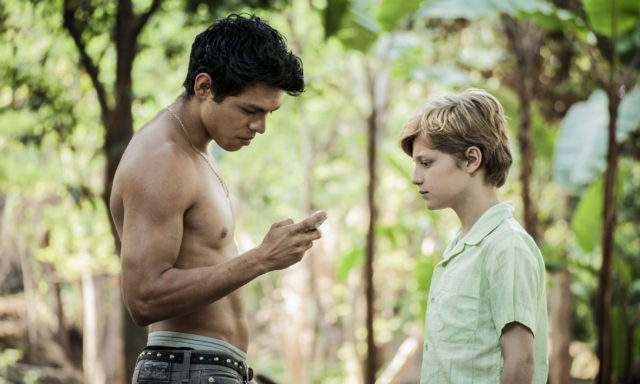
“Cuernavaca,” photo courtesy of Outfest.
Cuernavaca (DGA 2, 2pm): A Mexican narrative feature by director Alejandro Andrade Pease. After his mother dies unexpectedly, Andy moves into the palatial residence of his strict, no-nonsense grandmother (played by frequent Almodóvar collaborator Carmen Maura) in the Mexican suburb of Cuernavaca. He finds comfort and refuge in Charly, the estate’s young gardener, who introduces him to an exciting world of danger, risk, and temptation. In this epic coming-of-age story, Andy will navigate the pain and joy that comes with grief, growing up, and finding your identity. Preceded By Two Fish (Dir: Antoine Dupont-Guerra, 11 min.).
The Gospel of Eureka (Harmony Gold, 2pm): In this documentary, fierce drag queens and evangelical Christians put on the performances of their lives in the secluded southern town of Eureka Springs, Arkansas. Poised between stereotypes and the fight for civil rights, filmmakers Michael Palmieri and Donal Mosher weave an eye-opening, optimistic portrayal of the deep American tensions between religion and the LGBTQ identity. A crowd-pleasing cinematic meditation on intense dedication and faith, the film shows that the symbiosis of the two worlds is closer than you ever imagined. Preceded by Mama Dragons: A Great Big Story (Dir: Andria May-Corsini & Adam Wolffbrand, 13 min.).
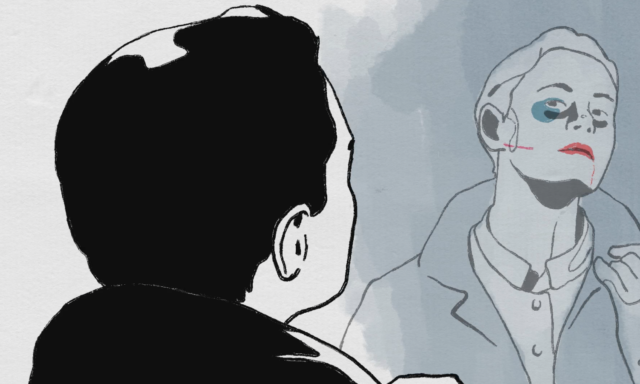
“The Man-Woman Case,” photo courtesy of Outfest.
The Man-Woman Case & Other Animated Tales (REDCAT, 2pm): Beautifully illustrating the complexity of the queer experience in both its exhilarations and travails, this compilation of sometimes absurd, sometimes moving, but always intimate stories is a feast for the eyes and the soul. The fluidity and ethereal nature of animation are used to explore parent-son relationships, bask in a bawdy feminist fairy tale, reminisce on young summer love, and follow the noir epic of Eugene Falleni, the true story of a 1920s trans man running from the law. Manivald (Dir: Chintis Lundgren, 12 min.), Venus – Filly, The Little Lesbian Fairy (Vênus – Filó, A Fadinha Lésbica) (Dir: Sávio Leite, 6 min.), Contact (Dir: Léa Bancelin, 6 min.), The Fish Curry (Maacher Jhol), (Dir: Abhishek Verma, 12 min.), Flash Flood (Dir. Alli MacKay, 6 min.), The Man-Woman Case (Dir: Anaïs Caura, 45 min.).

“Daddy Issues,” photo courtesy of Outfest.
Daddy Issues (DGA 1, 4:30pm): The US premiere of a film by director Amara Cash, this is an intoxicating invitation into the lives of two young women, one a fearless charmer, the other a talented but shy artist. When the pair meets, their lips and their lives collide, and the chemistry is electric. Combining their skills to design a clothing line, the girls spend every waking moment together, until the unthinkable happens. This candy-colored glimpse into first love is not only gorgeously shot, but it’s also driven by slick editing and an empowering soundtrack, immersing the viewer — or voyeur — into a world laced with potent sexuality. Preceded by Mendhi (Dir: Sudeshna Sen, 2017, 4 min.).
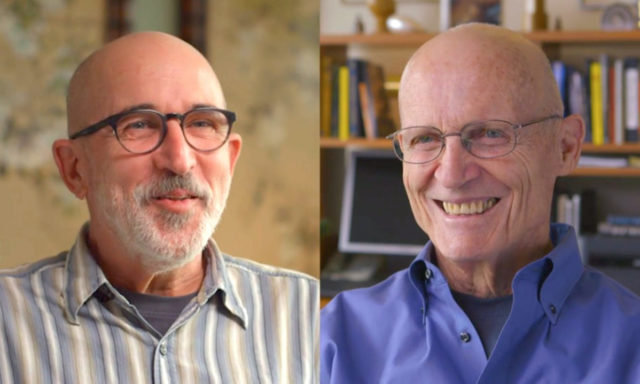
“Conversations With Gay Elders,” photo courtesy of Outfest.
Conversations With Gay Elders (DGA 2, 4:30pm): In this illuminating and heartfelt new documentary, the director of We Were Here and The Cockettes sits down with Kerby Lauderdale, who looks back on life before and after Stonewall, from marriage to a woman (he’s the father of Pink Martini lead singer Thomas Lauderdale) to queer activism. Part of a series of documentaries in which David Weissman, 62, will interview a diverse cross-section of elder members of the LGBTQ community. Preceded by Gavin Grimm VS. (Dir: Nadia Hallgren, 19 min.).
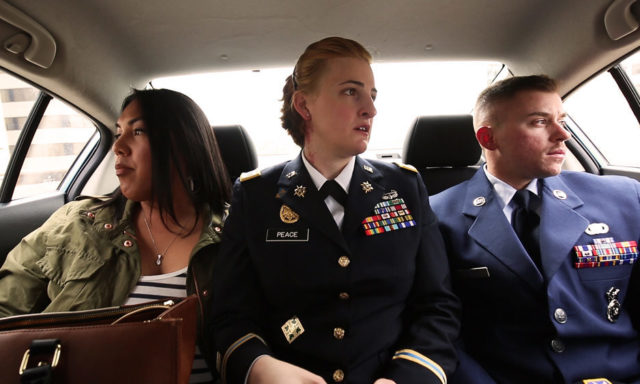
“TransMilitary,” photo courtesy of Outfest.
TransMilitary (Harmony Gold, 4:30pm): At the risk of being discharged and losing their livelihoods, trans service members come out to top brass at the Pentagon to challenge the transgender military ban. From 2015 to the present day, this documentary by directors Gabriel Silverman and Fiona Dawson follows four trans service members—Senior Airman Logan Ireland, Corporal Laila Villanueva, Captain Jennifer Peace, and First Lieutenant El Cook—as they fight to defend their equal right to serve their country. A 2018 SXSW Audience Award winner. Preceded by Pre-Drink (Dir: Marc-Antoine Lemire, 23 min.).
The Wild Boys (Les Garçons Sauvages) (REDCAT, 4:30pm): Director Bertrand Mandico’s genre- and gender-bending surrealist work zigzags through a perverse, hyper-stylized world of transgressions. In this nightmarish adventure, well-bred teenage boys, played by women, commit a heinous crime and are sent to sea with the barbaric Captain. Landing on a magical island with bizarre animals and lascivious plants, the teens metamorphize. Outrageous vulgarity blends with refinement as machismo’s cruelty and the glory of sexual freedom are exposed in this phantasmagorical visual feast and erotic fantasia.

“We The Animals,” photo courtesy of Outfest.
We The Animals (DGA 1, 6:45pm): Lovely and lyrical, this film received well-earned comparisons to “Moonlight” when it premiered at the Sundance Film Festival. Acclaimed documentary filmmaker Jeremiah Zagar makes his narrative debut with this adaptation of the novel by Justin Torres about three boys navigating their parents’ volatile relationship and the aftermath of their breakup. Two of the sons clearly follow in the footsteps of their macho, anger-prone father (Raúl Castillo, “Looking”), while the sensitive youngest, Jonah (Evan Rosado), remains close to their mother (“Sheila Vand,” “Women Who Kill”). Exquisitely photographed by Zak Mulligan, the film captures both the beauty and terror of childhood, guiding us through the wonders of the world and the pain and confusion of marital dysfunction. Subtle and haunting, bursting with empathy and energy, this achingly crafted coming-of-age tale heralds a new chapter for a brilliant and essential storytelling talent.

“Kiki and the Mxfits,” part of “Queeroes,” photo courtesy of Outfest.
Queeroes (Harmony Gold, 7:30pm): Discover the Queeroes short film series, part of an innovative new mentorship from 5050by2020 (an initiative of Time’s Up) and them (a queer non-binary digital platform of Conde Nast) that elevates queer, trans, and POC storytelling. Curated by Emmy-award winner Jill Soloway, participating mentors include Emmy-award winning writer Lena Waithe (“The Chi”) and playwright and TV writer Tanya Saracho (“Vida”). The films include a re-imagining of the classic Broadway movie musical with a Black butch lesbian dancer in the starring role, a sassy post-gender Hollywood landscape set in the near future, and a rowdy high school comedy through a genderfluid Latinx lens. Followed by an extended discussion with the cast and crew of each film. Central & Broadway (Dir: Chelsea Woods, 8 min.), Mother Comes To Venus (Dir: Zackary Drucker, 8 min.), Kiki & The Mxfits (Dir: Natalia Leite, 8 min.).
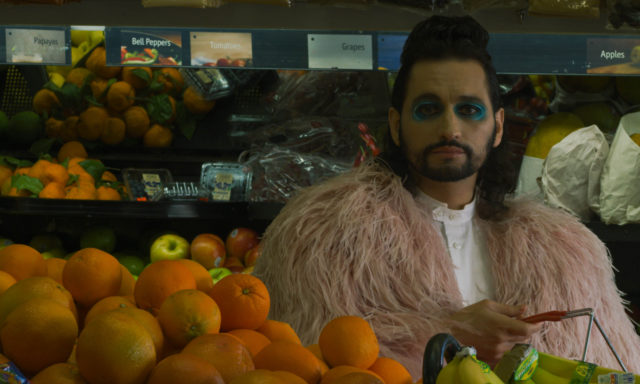
“Only Trumpets,” part of the Platinum Shorts Showcase, photo courtesy of Outfest.
Platinum Shorts Showcase (REDCAT, 7:30pm): Desire, danger, obsession, loneliness, love lost, found, and twisted are all part of the tales told in this year’s showcase. The Sermon (Dir: Dean Pukett, 2018, UK, 12 min.), Hibernaculum (Dir: Tyler Lumm, 2018, USA, 7 min.), Only Trumpets (Dir: Tristan Scott, 2018, USA, 10 min.), How To Make A Ghost (Dir: Gabriela Escovar, 2018, USA, 2 min.), Landline (Dir: Matt Houghton, 2018, UK, 12 min.), Grooming Men Under The Falstaff Sign (Dir: Jory Lee Cordy, 2018, USA, 3 min.), Wait (Dir: Sarah Prinz, 2018, USA, 7 min.), Exhumation (Dir: Daniel McIntyre, 2018, Canada, 8 min.), No Leash (Dir: SSION, 2017, USA, 12 min.), Dressed For Pleasure (Je Fais Où Tu Me Dis) (Dir: Marie de Maricourt, 2018, USA, 17 min.), Tea Bag (Dir: Jacquie Ray, 2018, USA, 3 min.), Crashing Waves (Dir: Emma Gilbertson, 2018, UK, 4 min.), Drag Me In Place (Dir: Michael Zarowny (Mood Killer), 2018, USA, 3 min.).
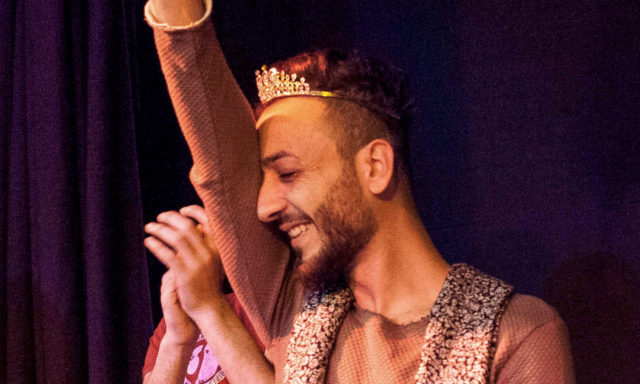
“Mr. Gay Syria,” photo courtesy of Outfest.
Mr. Gay Syria (DGA 2, 9pm): Hussein is a Syrian refugee who lives in Istanbul and works as a hairstylist. At gay support group “Tea and Talk,” Hussein and his friends discuss the issues they face in their homeland. Hoping to bring their cause international media visibility, they decide to participate in the Mr. Gay Syria competition. Writer-director Ayse Toprak’s riveting documentary shines a compassionate light on the ordeals encountered by these brave men as they face possible persecution and physical violence on a day-to-day basis. Preceded by Margo & May (Dir: Meredith Koch, 5 min.).
Hard Paint (Tinta Bruta) (DGA 1, 9:30pm): Online, Pedro smears neon paint across his body for pay-per-view voyeurs hungry for his webcam erotica. IRL, he rarely sees the sun or speaks to another soul in Porto Alegre. After catching word of a rival ripping off his rainbow-colored act, he ventures from the shadows to settle their score — but finds an unlikely new friend in the process. This Berlinale Teddy Award winner conjures a dark, sensual atmosphere of alienation and discovery, and marks the return of young Brazilian filmmaking duo Filipe Matzembacher and Marcio Reolon back to Outfest for the third time after their previous feature “Seaside” and miniseries “O Ninho (The Nest).”

“Are We Good Parents?,” part of “All About Your Mother,” photo courtesy of Outfest.
All About My Mother (Harmony Gold, 9:30pm): From “Mommie Dearest” to mom of the year, there will always be myriad ways to define motherhood in the movies. And whether you are one, have one, or know one, we all have our own unique experiences around how these ladies fit into our lives. Between mama bears a bit too woke for their own good to those sleeping on their children’s talents, new mothers facing discrimination or those struggling to understand their queer children, these films capture maternity in motion. Curated by Albert Payano. Are We Good Parents? (Dir: Bola Ogun, 9 min.), Rani (Dir: Hammad Rizvi, 14 min.), Dario (Dir: Manuel Kinzer, Jorge A. Trujillo Gil, 15 min.), Between Us Two (Dir: Tan Wei Keong, 5 min.), Uninvited (Dir: Seung Yeob Lee, 20 min.), Khol (Open) (Dir: Faroukh Virani, 12 min.), For Nonna Anna (Dir: Luis De Filippis, 14 min.).
PANELS:
Make Them Hear You: The Truth About Content By & For LGBTQ+ Women (DGA 2, 12pm): LGBTQ+ women have been at the forefront of many movements throughout history. However, in Hollywood queer women remain the least represented community in front of and behind the camera. This discussion will explore the past, present, and future of LGBTQ+ women in entertainment, bringing together trailblazers who are leading the charge for a more inclusive and multi- dimensional landscape. Presented by AT&T Hello Lab— a collection of inclusive original entertainment created by, for and with Millennial and Gen Z audiences. Panelists: Christine Vachon, Sara Shaw, Ashly Perez, Sidra Smith, Brooke Chaffin (moderator). Preceded by Tooth and Nail (Dir: Sara Shaw, 20 min.).
Bi In The Biz (DGA 2, 7pm): While the L, G and T communities have made great strides toward visibility in the culture, the B’s still remain relatively hidden, even in the entertainment industry. This panel will feature out bisexual actors and entertainment industry professionals discussing the specific challenges and opportunities for film, TV and online performers who identify as such. Break out of the bi closet as we explore the politics and the pragmatism of actors living out in the open.
PARTIES:
Platinum Alchemy Party (Navel, 1611 S. Hope St., Los Angeles, CA 90015): This year’s Alchemy brings magic to the dance floor with 5 non-stop hours of live music and DJ sets. Come see Outfest’s wild side during our flamboyant and fantastical night of turning poptastic weirdness into gold! Performers: Bae Bae (Dj Set), Bebe Huxley, Dorian Electra, London Jade, Lulo (Dj Set), Luna Lovebad, Miss Pvssy, Mood Killer, Narcisisster, Nebulae Cult, Saturn Rising, The Uhuruverse, Weston Allen.
Direct entrance to the venue is located through a large black gate on Venice Blvd. Follow the posted signs to the gate and enter through the first door on the left just past the gate. If you’re arriving via Lyft/Uber (which we highly recommend) using 418 Venice Blvd. as your destination and this will drop you off right in front of the black gate. If you’re arriving via Metro, the closest station is the Pico Station on the Blue & Expo Lines. Self Parking is available in the parking lot located directly underneath Interstate 10 (do not park in the lot attached to the building–you may be towed!). It’s cash only, payable to the parking attendant or to the parking payment box, if the attendant is not present. Street parking (or Lyft/Uber/Public Transport!) recommended.
Events
New ‘Party with a Purpose’ lesbian brunch to be hosted at Sorry Not Sorry
Lez Brunch is coming to Sorry Not Sorry L.A. on May 17 with bottomless mimosas and games

Jessica Wagstaff is the founder of Homology L.A. and most recently partnered up with The Queer 26, a nonprofit platform for QTBIPOC creatives, to produce Lez Brunch. The brunch will be hosted on May 17, from noon to 4p.m., at Sorry Not Sorry. The 4,000 sq-ft event space is a well-respected wine-forward, cocktail bar in Los Angeles that also hosts lots of other LGBTQ events, drag shows and more, throughout the year.
Wagstaff believes it is important to not only host this event, but also to make it as safe and inclusive as possible. They have also incorporated a community outreach aspect to this event by giving back to their community by donating proceeds to non-profit and mutual aid organizations.
Everything down to the ticketing site, is queer and inclusive.
“The ticketing website allows attendees to enter in their name which may differ from their legal name, which I think is a really important aspect right off the top of the bat, they know we care about who they are right at the start of their experience with us,” said Wagstaff. “In fact the ticketing website is the only platform that is queer owned and operated in the world, it’s called Sickening Events. So we know that it’s also benefiting our community.”
The performers are also part of the LGBTQ+ community and Wagstaff believes that by having a line-up of performers and entertainers who mirror and represent the community, it allows people to feel safe, heard and seen.
“I’ve always been very passionate about having a lineup that directly mirrors our community from BIPOC, trans, queer, non-binary, etc,” said Wagstaff.
Wagstaff is also a licensed security guard who says safety and security is on the top of their priorities when it comes to hosting these events.
“I will have a code of conduct signage and training at the front door which will be promoted by wait staff, restaurant management, plus all Lez Brunch talent and staff,” said Wagstaff.
The event will be hosted by Ruthie Alcaide who is a TV personality who has been a contestant on The Real World: Hawaii, a finalist on Battle of the Sexes and All Stars 1, and she also competed on Battle of the Sexes 2, The Gauntlet 2, and The Duel II.
Wagstaff is also working in collaboration with Camille Ora-Nicole, founder of The Queer 26 and multi-hyphenated creative.
Ora-Nicole has been hosting events and collaborating with queer and trans BIPOC creatives across Los Angeles to bring more visibility to those marginalized communities. Her and Wagstaff agree that queer joy is the biggest form of resistance and that hosting these events during this politically polarizing time is much needed for survival and for the people in these communities to have the space to heal, gather, celebrate and network.
To learn more about The Queer 26, visit their website.
Events
Los Angeles Blade’s Community Series kicks off with panel
First panel in series brought in community leaders, politicians and other notable figures

The Los Angeles Blade kicked off its “Free Community Series” in partnership with Roar
Resistance, for a rousing discussion panel titled “Time To Get Informed, Time To
Resist” at The Abbey in West Hollywood last Saturday.
The event featured a panel of notable figures in the city’s government and queer
activism circles who spoke about how to organize and protect queer rights in the current
political climate.
The panel was moderated by Roar Resistance’s Michael Ferrera, and included West
Hollywood Mayor Chelsea Byers, former WeHo Mayor and queer activist Abbe Land,
Equality California Communications Director Jorge Reyes Salinas, Political Vice
President of the Stonewall Democratic Club, Nico Brancolini and NAACP LGBTQ
Committee Chair Chris Baldwin.
The discussion kicked off with a call by Abbe Land for participants to stay focused on
the issues that matter, despite the flood of new developments constantly coming from
the White House.
“I do think it was designed that way to keep us crazed, to keep us unfocused, to keep us
in a state of panic and fear,” said Land. “We have to look at what is happening and
where is our lane and where are we going to focus our energies and have trust that
there are other people that are focusing in other areas that need focus.”
Each of the panelists then described how the first few months of the current
administration has impacted the work they’re doing in the community and the dangers
they see on the horizon.
“I have been deeply disturbed by the elite capitulation that occurred this time around,”
Brancolini said, noting the big law firms and media corporations that have acceded to
“unconstitutional orders” and rushed to make settlements with Trump and his family.
“Frankly, I’ve been disappointed by a lot of the national Democratic leadership. I think
they treated a 1.5% plurality victory on Trump’s behalf as if it was a huge blowout, and I
think that’s a big mistake,” said Land.
Reyes Salinas pointed out that a one of the most vulnerable communities right now is
trans youth.
“The target is on their backs and the backs of their families and providers,” he said.
“Here in California, we have laws that protect them and we keep improving those, but
there’s still so much fear, and it’s important for everyone to be able understand that
these are children’s lives at stake here.”
But while there was agreement that there is much at risk at the current moment, Chris
Baldwin said this was a time to build stronger coalitions.
“I don’t live my life in fear. I am a Black woman born in the 60s, at a time when my father
when we traveled to Alabama had to step across the street to let a white man pass,”
she said. “We will get through this. Black people have lived through much worse.
Welcome to the civil rights movement. We are going to experience setbacks but we will
keep pushing forward.”
Later, Baldwin invited attendees to join the NAACP, noting that it is an interracial
organization whose membership is open to all. Chelsea Byers echoed that sentiment, noting that this moment presents an opportunity for a new generation of leaders to imagine new ways to solve society’s big problems.
“We know that people are under-resourced. We need to make education accessible to
people bring them on board, help them understand these processes and meet them
where they’re at,” she said. “We need to bring people on board. We can’t go back to
what was, because it wasn’t working. We need to activate our political imaginations in
the biggest way possible.”
When the discussion turned to what people can do to protect our rights, the panelists
focused on practical things anyone can do to help build a successful coalition for
change.
“Every day, do something. It doesn’t have to be a big thing. It might be just calling
someone to check in on them, it might be writing a letter, or calling your congressman. It
might be a passive thing,” said Land. “That moment when you think, ‘Oh my god, I can’t believe this,’ that’s when you do something, anything and it’ll propel you for the next
day.”
The panel also addressed concerns from the audience that we have to ensure that our
activism is inclusive and intersectional.
“Feminism without intersectionality is just white supremacy,” Baldwin said. “Going
forward with your coalitions, I encourage you to be intentional with your intersectionality,
not just tokenism.”
“There are some common needs that we all care about and it doesn’t matter who you
are, and that’s where we have to be. But when we’re fighting for those things, we have
to recognize there are some people who have different ideas of what that looks like, and
we have to be open to that,” said Land. Reyes Salinas added that it’s an important priority for Equality California to use its platform to lift the voices of diverse parts of the community.
“We can elevate your coalitions, your storytelling, whatever’s happening, my team can
make sure that that’s elevated to ensure that other people see you as a trusted source,”
he said.
Reyes Salinas added that Equality California offers leadership training programs for
people who want to get experience in politics and running for office.
The Los Angeles Blade is planning more community forums to discuss hot-button
issues as they arise.
Arts & Entertainment
Infectious ‘Egghead & Twinkie’ celebrates love and allyship
Lesbian teen takes journey to self-acceptance with straight BFF

If you’ve ever wondered why so many queer movies are are coming-of-age stories, it might be that you were lucky enough to go through the transition into young adulthood without having to worry about your sexual alignment or gender identity being acceptable to your family or your friends or the world at large – and if that’s the case, we are truly happy for you. That’s the way it should be for everyone.
Unfortunately, it’s not.
For many millions of queer kids, growing up is still an experience fraught with fear, shame, and very real peril, and this was true even before the current era of government-sanctioned homophobia and bigotry. It’s never been easy to become who you are when you’re surrounded by a family or community that refuses to accept who you are. It’s as near a “universal” queer experience as one can imagine in a demographic as diverse as ours, and it reinvents itself with each new generation — so there will always be an appeal for queer audiences in stories which express that often painful odyssey in a way that makes us feel “seen.”
That’s why “Egghead & Twinkie” — a 2023 film fest fave only now getting a VOD release (on April 29) — is such a welcome and refreshing addition to the genre. A passion project from Asian American filmmaker Sarah Kambe Holland, who expanded it into a feature from a “proof-of-concept” short she made in 2019, it brings a Gen Z perspective, which makes it as unique and contemporary as it is recognizable and relatable.
Set in suburban Florida, Holland’s movie centers on the relationship of its two title characters. “Egghead” (Louis Tomeo) and “Twinkie” (Sabrina Jie-A-Fa), childhood friends with a deep bond from growing up across the street from each other, face a crossroads as the cute-but-nerdy Egghead prepares to depart for college, leaving behind Twinkie — an Asian-American adoptee raised by socially conservative white parents who is one year his junior just as she is beginning to come to terms with her long-hidden lesbian identity.
Planning to connect with her social media crush (Ayden Lee) at a nightclub event in Texas, she enlists Egghead to accompany her as she “runs away” from her restrictive parents into the arms of a girlfriend she has never actually met in person, at a bar she’s too young to get into. Needless to say, it’s not a great plan — especially since the straight Egghead has long-hidden feelings of his own for his B.F.F — but it leads to a shared adventure in which they each must redefine both their feelings and their commitment toward each other, while staying one step ahead of her frantic family and dealing with the mishaps inherent in taking an impromptu cross-country road trip in a car you stole from your father.
There’s a youthful verve to the whole affair, punctuated with the inevitable irony that comes from watching it unfold through the eyes of age and experience. Something that younger viewers may appreciate less than its spirit of boldness and (admittedly comedic) rebellion — and embellished with a visual aesthetic that reflects both Holland’s background as a YouTube “content creator” and the lead characters’ shared love of comics and anime.
But what gives the film that extra “oomph” and makes it feel more significant than many of the other youth-oriented queer entertainments of recent years is not so much about the style of its storytelling as it is the nature of the relationship at its core.
Though “Egghead & Twinkie” is unequivocally a queer coming-of-age movie — which certainly deals with its teen lesbian protagonist’s journey to self-acceptance and includes an unexpected but irresistible connection with a fellow queer, Asian American teen (Asahi Hirano) she meets along the way, unapologetically endorsing the validity of its heroine’s romantic pursuit, however misguided it may seem — it is ultimately a film less about queer identity than it is about friendship.
While it allows ample opportunity for Twinkie to refine her values and learn from the mistakes of her rebellious quest for self-acceptance, it never loses sight of the fact that her long-term relationship with Egghead is one of mutual support and unconditional love. More than a romance, this YA-ish story of love beyond sexuality is a tale of true ally-ship, in which the unconditional understanding between friends — between fellow living beings — becomes more important than the romantic fantasies of a more naive conception of queer existence.
It’s a love story, to be sure, but the love it lifts up is the kind ultimately has little to do with questions of sexual identity. Instead, it’s the kind that transcends biology and sexuality to express something arguably more essential — the genuine emotional bond between two kindred souls that has nothing to do with either, but rather draws its power from shared experience and mutual acceptance. It’s that rarest of movies that celebrates the value and importance of platonic love that stretches across personal boundaries or divides, and ultimately reinforces the connections of shared humanity as being at least as much important as those created by our sexual makeup.
It’s a love story between friends, not a romance between strangers, and the fact that its platonic protagonists are able to find the value of their connection beyond juvenile assumptions and impulses makes it arguably a more mature and insightful experience than even the most idealistically rendered young-love fantasy could ever hope to be.
Of course, its success in achieving that goal hinges on the chemistry between its two young stars, and both Jie-A-Fa and Tomeo capture that alchemical magic with natural ease; both performers originated their roles in the short that inspired the feature, and the familiarity of their chemistry goes a long way toward making it work. Additionally, the performances of both Hirano and Lee — indeed, even of Kelley Mauro and J. Scott Browning as Twinkie’s clueless but ultimately loving adoptive parents — avoid the kind of judgement and clichéd convention that might otherwise make them predictable stock caricatures.
In the end, though, it’s the hopeful, humanistic vision of Holland — who also wrote the screenplay — that informs “Egghead & Twinkie” and helps it resonate beyond the typical. In crafting a queer coming-of-age story that has less to do with sexual wiring than the need for the grounding, life-affirming reinforcement that comes from unconditional love, she has managed to craft a vibrant, hopeful and heartfelt testament to the power of real humanity to overcome and transcend the prejudices and boundaries imposed by a social order that hinges on conformity over individual fulfillment.
That’s not just a queer issue, it’s a human issue — which is why this sweet, charming, and genuinely funny teen “non-rom com” captures us so willingly and so completely.
Events
Celebrate Lesbian Visibility Week with The Curve Foundation
This week’s events are hosted in collaboration with The Curve Foundation

Lesbian Visibility Week, which is running now to April 27, is a nationally recognized celebration created by The Curve Foundation to honor lesbians and sapphics and their accomplishments.
The events this week will be hosted by Cinnamon Rivera, a well-known and active voice in the queer, Latinx,community, and Alex Banx, a well-known community voice in the queer, Black community.
“I’m personally excited about our BIPOC Lesbian Speed Mingling event happening on Lesbian Visibility Week Friday,” said Banx. “The event sold out with more than a week to go, [so] the need was clearly there. A lot of people can be socially timid, so this is why we wanted to make it easy — take the pressure out. This isn’t just about dating, this is about creating sustainable, long-lasting connections; whether they be friends, lovers, business partners, or whatever else happens.”
On Thursday, LVW will celebrate with a Drag King takeover at Micky’s in West Hollywood. The event will be a collaboration between The Curve Foundation and Them Fatale, a drag king collective that is inclusive of performers who do not identify as cis men outside of drag.
The event will feature drag by Manny Oakley, Malcolm Xtasy, Jack Doff, Precious Julz, Anna Shevitz and will be hosted by Provvidenza.
On Friday, Lesbian Visibility Week will make its way through Long Beach. Adelita’s Revenge, a Latinx, queer-owned business, inside Viento y Agua, a Latinx and queer-owned coffee shop. They will be hosting the Lynx for Lez Speed Mingle night.
On Saturday, LVW will host two events across L.A. and Long Beach.
One will happen at KISO, DTLA’s newest queer bar. The event hosted by Cinnamon Rivera will feature a line-up of poets, DJ’s, vendors and art on display.
The event, which will happen from 4p.m. to 9p.m., will also feature live performances by Irene Díaz, a Chicana singer-songwriter from East Los Angeles who gained popularity for her timeless love songs. Nico Turner, a multi-instrumentalist and musician from Los Angeles, who’s known for hosting the infamous Gay Asstrology parties.
The exciting line-up of poets will feature Karla Lamb who’s known as VinylOwl on Instagram, host Cinnamon Rivera and Verónica Reyes, who’s known as EastLosAngelesPoet on IG.
That same day, LVW will also host the Queer Women in Sports Day panel at Watch Me Sports Bar at 3p.m.
The event is set to feature an exciting line-up of panelists such as Rachel Pearson, lead video editor and ESPN EQUAL Advisor for ESPN; Carmen Bona, president of business operations at Angel City Football Club; Evan Unrau, director of social and community impact at LA84; Julie Shaw, Ph.D., leadership and DEI consultant; and Jax D., owner of Watch Me! Sports Bar.
To learn more about this week’s events and find local, as well as national events, visit the website.
Bars & Parties
Bear World Magazine gives the bear community a mighty roar
Richard Jones is fighting the good fight in queer subculture representation

Entrepreneur and co-founder of Gray Jones Media, Richard Jones is the mastermind behind Bear World Magazine. Together with his editor, Robin Gray, they understand that their publication is needed now more than ever.
In 1979, George Mazzei wrote an article for The Advocate characterizing gay men by certain animals titled, “Who’s Who in the Zoo?” It was that article that gave voice to the chubbier, hairier, gay man — the almighty ‘bear.’
The term took wing and by the mid-1980s, gay men, who identified as ‘bears’ would gather in social and sexual settings. Feeling ousted because of body type and hairy body parts, these bear groups would congregate separate from the gay community at large, feeling safe and accepted in their own circle.
Presently, the bear community is a thriving, worldwide community with a variety of events and social groups, and the members of that sector have grown to include all shapes and sizes. Over the last decade, the bear community has gained a bigger presence in mainstream gay culture and one can spot a number of twinks at bear pool parties as well as a large contingent of bears showing off on Pride main stages. As the celebration of body types gains traction and the pressures of peak physique diminish, the segregation of the bear community and the rest of gay culture has faded.
Keeping the bear voice very much alive is Bear World Magazine, which is ready to celebrate 13 years in media. Celebrating the bear culture and all of its varying members, is at the forefront of Bear World, without diminishing the queer community that exists beyond the ‘zoo.’
Despite the challenges that chubbier men face because of societal norms and despite the challenges that queer media has faced in recent political climates — they continue to fight the fight via their online publication, podcasts, awards, nationwide events and video content.
The bear’s roar continues to represent.
We chatted with Jones as we compared notes on queer media, building a legacy and what the future of queer representation might look like.
What was the inspiration for starting Bear World?
It was all an accident. I was a member of a bear online group that is no longer around and for the life of me cannot remember the name. They asked the 30,000 members for help with ideas to save the site. Server costs were crippling, etc. I pitched them an idea to create their own magazine. I would own it but license their name and split the ad money with them. They liked the idea and asked me to pitch it more formally. I started to prepare that and then never heard from them again. I think our idea was great but wasn’t going to make enough money for them quick enough. In the end, I realized I could do it anyway and changed the name to Bear World Mag and here we are almost 13 years later.

Bear World Mag’s first cover, featuring the cast of “Where The Bears Are,” in August 2012. Photo courtesy of BWM.
What was your first exposure to the bear world as a queer man?
Funnily enough, it was a visit to Ty’s in NYC — before I really knew what Bears were. I remember seeing ‘BEAR’ as a specific chat room in Gaydar (that’s an old reference) too — but had no idea. It wasn’t until I started going to Be Your Be Yourself (BUBU), which was started by the amazing Paul Bloomer in Belfast Northern Ireland over ten years ago now, and then a bear group there that I really understood how broad the community could be and how I could fit into it.
What are some of the biggest challenges in keeping BWM thriving?
I think trying to keep it fresh, keeping it looking forward as well. The community is ever-evolving and we try to showcase that. We miss things as we are a small team, so we are always encouraging people to tell us about their events, their groups and we try to showcase as much of the global bear community as we can. We have just started to cover the Australian bear community more deeply, with a new dedicated deputy editor Luka Musicki, who is on the ground talking to the groups and helping us find local advertisers!
What are some of the biggest challenges that queer media faces in general?
I hate talking about this but at the moment it’s the hesitation of advertisers to spend with us. The recent political upheaval has meant that the big advertisers are pulling away and the small advertisers might be more hesitant to advertise because of fear of the economy. We have seen media decline since the pandemic and those of us left are finding it harder to survive.
The appetite to pay for media just isn’t there. It means we have to be leaner and adaptable. It’s why we are starting our Bear World TV content, short videos from key bear voices, showcasing different elements of the bear community. All of us are used to consuming more short-form videos, the bears too. We are very excited about its impact and how it will help stabilize Bear World Mag.
What do you hear most from your readers?
They love the hairy content! I’m serious. I think the way we present a bigger different body —although never nude — is inspiring to them. Our bears of the week who are our readers basically from all over the world, are a key part of showing the community from 21-99 in all body shapes and sizes, we are so very diverse even in this niche community.
What are some of your biggest achievements with the magazine?
Well being here almost 13 years later is the biggest achievement. It was a quick idea that has lasted through greater content, great editors and writers and just never trying to tell the community what they should be but more mirroring them, where they are at all times. I’m proud of some key interviews including Armistead Maupin.
It was a big thrill to meet him and chat with him. He gives good hugs. I’m proud of our female and trans bears that have been cover stars, I’m proud of the young bears that have found us and have said how we helped them be confident in themselves. They always came at my most difficult times and helped me to keep moving forward.
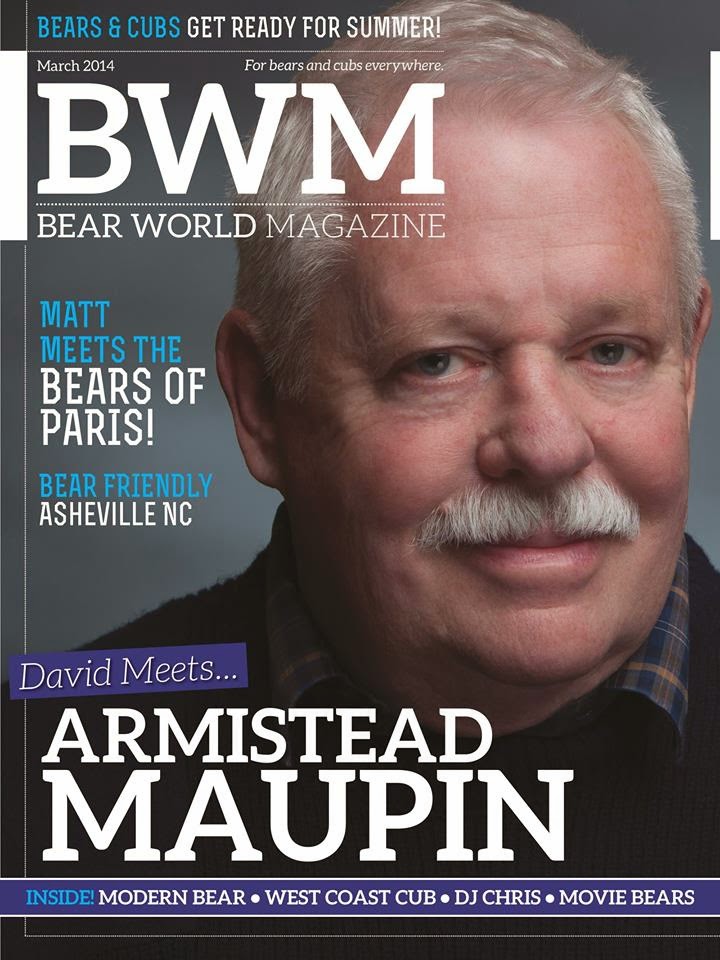
Cover of Bear World Mag featuring Armistead Maupin in 2014. Photo courtesy of BWM.
The bear community has been getting a much bigger voice and more representation in the queer world, why is that?
I think the biggest reason is that the queer community as a whole is getting more representation on mainstream TV, and the mainstream media. The dad bod and body positivity have helped our bodies be seen as attractive. It’s been great to see bears become character choices over the years across many different TV and films. I had the opportunity to interview the very bear-y straight actor Patrick Cox, who played John on “Two Broke Girls.”
I think [he is] a very ordinary representation of a bear and he was not there to be the butt of fat jokes. The “Will & Grace” reboot had Jack partnered with a bear cub. We have seen bears referenced on “30 Rock,” and even the reboot of the “Muppets” had Fozzy Bear talk about gay bears briefly. Just recently on “The Connors” the greatest Bear Icon of all time, Dan, (some would say) referenced the bear community which in a weird way was beautiful to see.
So it all comes back to representation matters. Writers and show-runners are plugged into the community and are now likely to be queer themselves. A key writer on “Saturday Night Live” is queer, so we’ve seen a lot more queer references on that show in recent times. We, of course, are thrilled to see it.
You also do events around the nation. What do you love most about the fellowship of the bear community at these events?
We do a couple of events, Key West Bear Weekend and now WOOF week also in Key West, in partnership with Island House Resort. [That’s our] cheeky plug, thanks!
I think the fellowship is the strength and growth of Bear Weeks and Bear Weekends around the country and the world. To be together and feel safe and attractive is what the queer community finds in any gay or queer bar — and us bears probably never had that. We were always the fat one or the hairy one. To head to a bear weekend and know that you will feel safe just for wearing a tank that shows off your furry shoulders is a tonic to us all.
Add in that we might actually feel attractive and flirted with, and you can see why bears flock to these events. So the fellowship follows, lifelong friends are made and it’s why these events are now starting to hit 20 or 30-year anniversaries. It’s like coming home. Walking down the street in P-town during Bear Week holding your husband’s hand without a worry is magical.
How has the bear community changed the most over the years?
I like to think it’s queerer. Bears can be masculine still, but also a little queer, maybe embrace not feeling that we have to wear plaid, but maybe a crop top and wear pink. And of course that we are more and more making space for our female sisters and trans brothers has been wonderful to see.
How can the general queer community best support the bear community?
That’s a great question. I think as long as we have space to be recognized, in any way at all and never marginalized — that’s all we ask. I think the bear community in turn should show up to support the fuller queer community too. Which I think we are. We always have more work to do, but I think the recent uproar about a bear campsite not welcoming trans bears and then the wider bear community rejecting that and then boycotting that camp, showed who we are at heart. It makes me very proud.
There is much division in the nation right now, also within the queer community. Why is it so important to celebrate the “bear” label and all that subcategories it comes with?
I think this is a time the queer community is able to and should come together, we realize collectively what we have been fighting for these last 50 or more years since Stonewall. We are used to being bullied, so I think on the whole we have thick skin. In celebrating the ‘bear’ label, I like to think we are encouraging of any group to celebrate who they are. Many more subgroups under the queer umbrella are much more visible now, look at how the rainbow flag has evolved, we will continue to as well. Our collective strength is not diminished if we are different from each other in some way, basically, that’s the human race. We need to fully embrace it and make room for all.
What have you learned most about yourself from being the Publisher of Bear World?
Oh gosh, that you can’t stand still. That media is ever evolving as much as we are as people. You have to be resilient and prepared to change because the world both in humanity and in commerce, will change and evolve and you cannot stand still or it will pass you by.
What can we look forward to this year from Bear World?
Well, we are about to start planning for the Bear World Magazine Awards Year three which will be in N.Y.C and part of the Urban Bear Weekend, and the red carpet celebration will be at ReBar. We are really excited about our new video content — which we think will be transformative for us and for the community. More Great covers, so much more content about the Australian bear community too — that’s truly exciting to dive into.
What is your message to the queer community?
Stay strong, find and support the community you are in or want to be part of and live with as much joy as you can because that pisses the haters off way more than our anger. But keep the anger too. We need that as well to fuel our never-ending fight.
Follow everything at Bear World Magazine.
a&e features
Anthony Nunziata Performs the Great Palm Springs Songbook
He brings his signature genre-blending sound to the West Coast

‘America’s next romantic singing sensation,’
As the desert sun dips below the horizon this weekend, the Purple Room in Palm Springs will fill with crooning tales of love, loss and longing. Fresh from a sold-out run at Café Carlyle in New York, Anthony Nunziata brings his signature genre-blending sound to the West Coast. Nunziata invites audiences on an intimate journey through heartfelt originals and inventive takes on timeless classics, joined by cabaret favorite Joan Ryan and acclaimed pianist Jeff Franzel.
“Romance is so nuanced and I believe it begins with being vulnerable and honest,” said Nunziata when asked what it means to be the next romantic singing sensation. “I try to live in my music and song as if the story is being played out for the first time.”
That emotional immediacy is central to his performance style — an approach that resonates deeply with audiences, especially within the LGBTQ community. Nunziata acknowledges that LGBTQ listeners often have a profound connection to themes of love, longing and resilience.
“My original songs dive deep into all of those themes — yearning, a sense of belonging, hope, strength, faith,” said Nunziata.
But it is not just the music that resonates. LGBTQ audiences connect with Nunziata on a personal level as well.
“I’m a proud member of the LGBTQ community,” said Nunziata. “In the time we have in this world, I strive to encourage people that they are worth it.”
“At my concerts, you are loved and you are celebrated for all the beauty that makes you, you.”
While Nunziata’s original musical and personal presence embrace LGTBQ+ life, many songs from the Great American Songbook – with some of these songs appearing in his repertoire – were originally written through a heteronormative lens. However, Nunziata is purposeful in his selection of songs. “I deliberately choose songs that can apply to anyone,” he states, emphasizing that “a good love story is a good love story.” With that inclusive mindset, he also reimagines these pieces through genre-bending interpretations.
“I love bending from R&B to folk to country and classic pop. All the ‘genre-bending’ will be on display in Palm Springs,” Nunziata explains.
Joining Nunziata on stage in Palm Springs is special guest and cabaret favorite Joan Ryan, the acclaimed American actress and singer known for her roles in the Los Angeles production of “Ruthless!” and as Miss Tina Paladrino on “Good Morning, Miss Bliss” — the show that would eventually become “Saved by the Bell.” Nunziata calls Ryan one of his dearest friends.
“She is so quick and witty,” he tells the Blade. “I am excited that she’s free amidst her busy schedule to come to Palm Springs and wow the audiences with her gift.”
In addition to Ryan’s guest appearance, jazz pianist Jeff Franzel serves as Nunziata’s musical director. “I’ve written over 50 songs with Jeff,” Nunziata shares, highlighting Franzel’s impressive songwriting credits with artists like Josh Groban, Placido Domingo and Taylor Dayne. Franzel also brings a bit of local history to the performance — he once played in Palm Springs alongside one of Nunziata’s musical idols, Frank Sinatra.
“It’s a great story, and he’ll tell it this coming weekend,” Nunziata adds.
As with many artists, collaboration plays a key role in Nunziata’s creative process. “The collaborators I work with all bring something unique and wonderful to the songs I’m a part of writing,” he shares. For Nunziata, collaboration isn’t just about combining talents — it’s about openness and vulnerability, creating space for honest expression and new ideas.
“Writing songs is so vulnerable and it feels like the greatest extension of therapy,” he describes.
Looking ahead, Nunziata dreams of sharing the stage with some of his musical heroes. “I can’t wait to do a duet with Adele one day. Andrea Bocelli, too,” he says. At the same time, he honors the legends who paved the way.
“I would have loved to have duet-ed with Sammy Davis Jr. or Frank Sinatra. I do a subtle tribute to Sammy in my concert that I’ll be bringing to Palm Springs.”
Nunziata will take the stage at the Purple Room in Palm Springs on April 18th and 19th. With his eclectic charm and heartfelt approach to songwriting, it promises to be an unforgettable performance — one you won’t want to miss.
Nunziata leaves readers with this:
“It’s beautiful to – as Sondheim so brilliantly wrote – make a hat where there never was a hat. To make something out of nothing. And, if you’re lucky, get to perform the song and touch some lives along the way. That is the driving purpose and passion for my songwriting.”
Bars & Parties
Rocco’s 2.0 is looking to the past to celebrate the future
Matthew Ross’s journey from bartender to new owner of Rocco’s puts him in a unique position to breathe new life into this WeHo hotspot
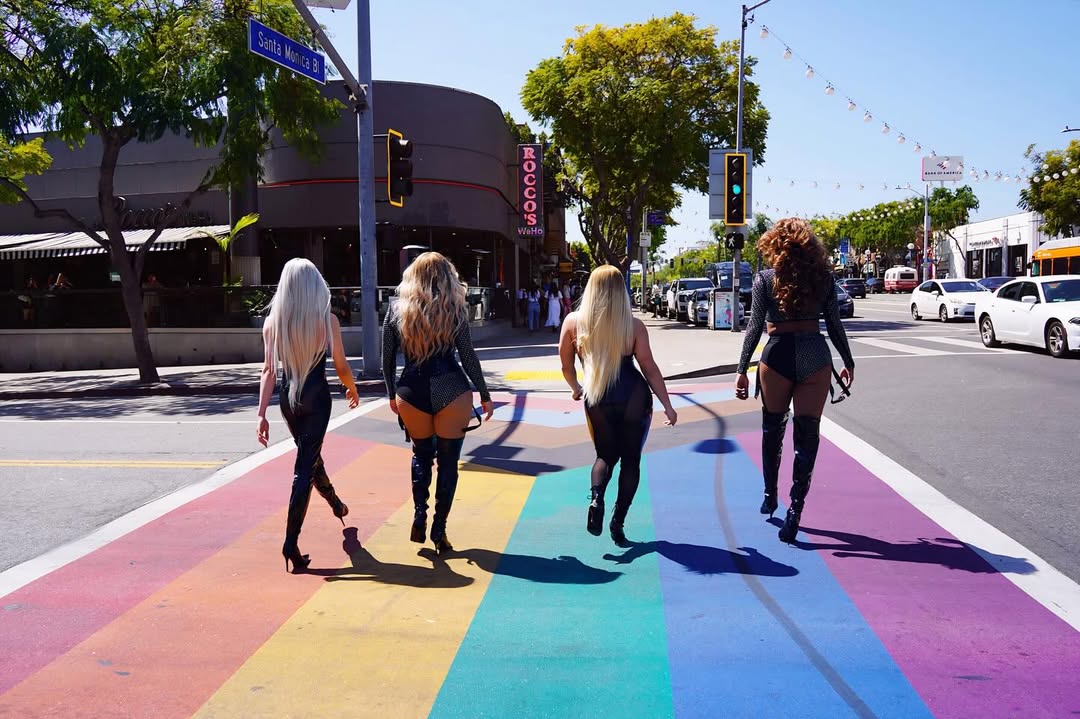
COVID-19 hit the queer bar and club life hard and since then, has struggled to regain its footing. There have been location makeovers, new Happy Hour menus and a bevy of new owners sprouting up on the scene to entice new and returning customers.
Rocco’s, one of West Hollywood’s most visible casual eateries and nightclubs is one the latest venues to gain new ownership. Previously owned by an investment group that included Lance Bass, Rocco’s now claims hospitality aficionado Matthew Ross as its new mastermind.
Who better to take over the vibrant spot than Ross? Ross has over 30 years of food and hospitality experience since working at Sizzler when he was just 16. From there, he has worked his way up from bartender, to Director of Food, Beverage and Nightlife, to now being the owner of Rocco’s.
Ross is a California native who grew up in Agoura Hills. His first foray into West Hollywood’s nightlife came by chance when a friend invited him to “18+ Night” at Micky’s.
“We didn’t know anything about gay bars. We had no idea what to do. We had no idea there were these many gay people in the world, we were shellshocked. That’s kind of where it started.”
Ross ended up going to the Fashion Institute of Design and Merchandising in Downtown, Los Angeles, to study interior design. While he was in school, he worked at some of the bars in West Hollywood and at Micky’s sister bar, Apache, in Studio City. He also got his real estate license, which he still has today, while keeping up his bar jobs. As life would have it, his hospitality career would take over and he found himself in hotels as Director of Food and Beverage. He would also return to Micky’s as a consultant, building the foundation that would make him a miracle worker for locations in need.
“I was a store fixer in a corporate world. I was someone who went to restaurants and bars and had to get them moving back to where the company wanted. So, I’m kind of a pro at going in and fixing things and making them better,” he said.
When the Rocco’s opportunity came about, Ross snatched it up. As someone who understands West Hollywood from an earlier generation, and with his finger on the pulse of what club go-ers want today, he is in a prime place to make some moves in the community.
“I really think it’s time to get back to original, fun West Hollywood because that’s been missing for many years, as far as I’m concerned. I love how free everybody is. We’re all very hard on ourselves and we’re hard on each other. But when we’re in WeHo, we’re in a safe space. That’s what we need in these trying, political times. We need a place where we are safe, and I’m going to make sure that everybody is safe and we’re going to be aligned.”
For Ross, taking over Rocco’s isn’t just about making the club successful. It is also about bringing the nightlife community together as a whole, hearkening back to a time when bars supported other bars because they were so different from each other.
“All the West Hollywood bars need an alliance where we’re all together and we’re protecting our own. But that also includes anyone who wants to join us. We’re not singling out any groups, but we are first and foremost LGBTQ, and that’s where our attention goes. We’re going to take care of our own.”
Ross’s previous experience also helps him not just on the client side of the experience, but on the business side. As a manager to thousands of employees and hundreds of managers, he knows about dealing with employee issues and California labor issues on many different levels. He understands budgets of all sizes, and he understands the steps it takes to create revenue.
To secure Rocco’s future, Ross is looking to elements of the past that made West Hollywood great. They are going to keep the name for now, are planning to remodel, and will keep sports event viewing as part of the lineup. But entertainment and themed events-wise, you may see a change.
“It’s time to get a lot of my old contacts together. I know a lot of DJs, I know a lot of promoters, not just the typical WeHo ones, but the whole L.A. experience.”
He promises busier nights that include live music, a rarity in West Hollywood and even bringing back an 18+ night, much like the beloved Tiger Heat. The 18+ themed night is what brought Ross to West Hollywood in the first place.
“We need to have somewhere for the young ones to go…a safe place, I’ll say that over and over. I just want to make sure everyone knows that we are back to the old, where we take care of our own. It’s not about money, it’s not about cover charge. It’s about – are you having fun and do you feel safe? And that’s what we’re doing.”
Among West Hollywood nightlife chatter, there is the sentiment that our younger, queer generation is not going out to bars and that the future of club-going might look bleak. Ross does not believe that.
“I have been a manager of Gen Z and Millennials now for 20 years. I’m very well versed in their habits and behaviors, and what I’m seeing, with even Gen Z, is that they want to get out into the world now. They are tired of being online. They’re tired of dating apps that go nowhere. They feel very singular, they’re by themselves even though they have hundreds of friends that they talk to online. They really need to be around other people and see what that’s about and have conversations. It’s not about liquor, it’s not about that; it’s about having a place to go where you actually meet people and you’re not on your phone all night.”
Another throwback to the past that Ross is bringing back is good old-fashioned bar service. There was a time that any Happy Hour in West Hollywood looked like a scene from “Cheers,” where everyone knew your name. Ross knows that power in that.
“Customer service needs to come back. When I walked into the bar, in the old days, my drink was on the bar. When my patrons came into Apache or to Rage or to any of the ones I worked at, the drink was on the bar ready to go. Lately, I have probably spent a zillion dollars at other bars and never was recognized.
We’ve had good bartenders over the years, but a lot of that has gone away. That is coming back to this bar. I’ve talked to my friends who own GymBar and some other locations around town and we’re all going to be on the same page, it is time. This is not just a bar, it’s a business with guests who want to be appreciated for spending their money. And the way money is now with everybody, they’re spending their last dollars to go out and have fun and it better be a good time.”
And Ross’s message to the community?
“Everybody, let’s come together. Let’s just cut out all the crap. It’s time. We’re all sisters, brothers, lesbians, trans, everything. We have to have each other’s back right now. We have a little part of the world, which is really a big part of the world because we know what West Hollywood brings to the LA area. We’re one of the biggest gay areas there is, period. We need to start coming together and giving all our brothers and sisters our business, there’s lots of small businesses around here other than bars that need our help.”
Arts & Entertainment
2025 Best of LGBTQ LA Finalist Voting

The 2025 Los Angeles Blade Best of LGBTQ LA Awards are here! You submitted your nominations—now it’s time to vote for the finalists. Voting is open through May 2, 2025.
Among some of your favorite categories are Best Drag Performer, Local Influencer of the Year, Best Happy Hour, Go-Go of the Year, Activist of the Year, Public Official of the Year, Best Musical Artist, Best Non-Profit, Best Bartender, Best DJ, Best Local Podcast, and so many more!
Winners will be revealed at the Best of LGBTQ LA celebration on Thursday, May 22 at The Abbey. Stay tuned for more party details coming soon!
Vote using the form below or by clicking HERE.
Books
‘Pronoun Trouble’ reminds us that punctuation matters
‘They’ has been a shape-shifter for more than 700 years

‘Pronoun Trouble’
By John McWhorter
c.2025, Avery
$28/240 pages
Punctuation matters.
It’s tempting to skip a period at the end of a sentence Tempting to overuse exclamation points!!! very tempting to MeSs with capital letters. Dont use apostrophes. Ask a question and ignore the proper punctuation commas or question marks because seriously who cares. So guess what? Someone does, punctuation really matters, and as you’ll see in “Pronoun Trouble” by John McWhorter, so do other parts of our language.

Conversation is an odd thing. It’s spontaneous, it ebbs and flows, and it’s often inferred. Take, for instance, if you talk about him. Chances are, everyone in the conversation knows who him is. Or he. That guy there.
That’s the handy part about pronouns. Says McWhorter, pronouns “function as shorthand” for whomever we’re discussing or referring to. They’re “part of our hardwiring,” they’re found in all languages, and they’ve been around for centuries.
And, yes, pronouns are fluid.
For example, there’s the first-person pronoun, I as in me and there we go again. The singular I solely affects what comes afterward. You say “he-she IS,” and “they-you ARE” but I am. From “Black English,” I has also morphed into the perfectly acceptable Ima, shorthand for “I am going to.” Mind blown.
If you love Shakespeare, you may’ve noticed that he uses both thou and you in his plays. The former was once left to commoners and lower classes, while the latter was for people of high status or less formal situations. From you, we get y’all, yeet, ya, you-uns, and yinz. We also get “you guys,” which may have nothing to do with guys.
We and us are warmer in tone because of the inclusion implied. She is often casually used to imply cars, boats, and – warmly or not – gay men, in certain settings. It “lacks personhood,” and to use it in reference to a human is “barbarity.”
And yes, though it can sometimes be confusing to modern speakers, the singular word “they” has been a “shape-shifter” for more than 700 years.
Your high school English teacher would be proud of you, if you pick up “Pronoun Trouble.” Sadly, though, you might need her again to make sense of big parts of this book: What you’ll find here is a delightful romp through language, but it’s also very erudite.
Author John McWhorter invites readers along to conjugate verbs, and doing so will take you back to ancient literature, on a fascinating journey that’s perfect for word nerds and anyone who loves language. You’ll likely find a bit of controversy here or there on various entries, but you’ll also find humor and pop culture, an explanation for why zie never took off, and assurance that the whole flap over strictly-gendered pronouns is nothing but overblown protestation. Readers who have opinions will like that.
Still, if you just want the pronoun you want, a little between-the-lines looking is necessary here, so beware. “Pronoun Trouble” is perfect for linguists, writers, and those who love to play with words but for most readers, it’s a different kind of book, period.
The Blade may receive commissions from qualifying purchases made via this post.
Theater
‘The Broadway Cage Match’ ready to rumble at WeHo’s Musical Mondays
This mainstay of MUMO returns to The Abbey on Monday, celebrating the group’s 16th anniversary

This coming Monday, Musical Mondays (MuMo) at The Abbey will be celebrating its big 16 year anniversary and will be honored by the City of West Hollywood, with infamous “The Broadway Cage Match” taking part of the celebration.
Cue up the music, “The Broadway Cage Match” is part improv, part sing-off and all fun. The entire affair is nothing short of spectacular because the singers are as impressive, as they are hilarious.
This popular MuMo institution was created by musical theatre guys Bruce Merkle and Justin Jones. These boys are as talented behind the scenes as they are on stage. This popular segment has become a much loved mainstay of this popular night.
Merkle originated the role of Olaf in “Frozen: Live,” at the Hyperion, directed by Liesl Tommy. He has also appeared on television in “Night Court,” “How I Met Your Mother,” “Rules of Engagement,” “The Goldbergs, RuPaul’s AJ & the Queen,” “Conan,” and had recurring appearances on “Victorious” and “The Tonight Show.”
He is a “Sunday Company” alumni at The Groundlings, where he periodically performs improv and sketch comedy. He is also a world renowned yogi, ranked 4th in the world and Michael Fassbender’s yoga double in David Fincher’s “The Killer.”

Bruce Merkle
Justin Jones made his Broadway debut in “Home for the Holidays” at the August Wilson Theatre and has appeared on Netflix’s “Sugar Rush,” “Tosh.0,” Lionsgate’s “The Newest Pledge,” and the Lifetime movie-musical “Christmas Harmony,” which he co-wrote with Nanea Miyata.
As a graduate of Circle in the Square Theatre School, he starred regionally with companies like Reprise Theatre Co., Casa Mañana and 3D Theatricals, co-created the “The Broadway Cage Match” for Rockwell Table and Stage and performed at venues including Birdland, Rockwell, Radio City Music Hall and more.

Justin Jones
We caught up with these two masterminds while they are gearing up for Monday’s big show.
What the heck is the Broadway Cage Match? Sounds dangerous!
JUSTIN: The Broadway Cage Match is a triple-threatening battle for showbiz glory. We started it in 2014 to showcase so-called ‘rival’ theater companies battling to see who was the best of the best. It was all about bringing your inner show queen, your inner diva, your inner poorly-adjusted showbiz kid to the stage.
We had people skrelt, belt and play fun improvisational showbiz games that commented on the absurdity of what it’s like to work in musical theater. It was all in good fun — a total celebration of the chaos and creativity of this art form. We got to work with amazing talent who brought their insanity and genius to the stage at Rockwell.
As Kate Pazakis, our producer, once put it: “It’s controlled chaos.” And that’s exactly what made it great.
BRUCE: We would have two musical that we’re playing at the same time and three people from each show would sing and compete in musical theatre inspired improv challenges. The audience voted on who went through and one show was victorious. The shows were so loud and fun. We always wrote special material and made sure each show was bespoke and tailored to the two musicals being featured.
What do you love about the local musical theatre scene?
BRUCE: I love how many theaters we have. So many people think this is just a film and TV town. And while that’s true, I bet there are three or so musicals playing at any given time. The talent is great too and the productions are on par with New York. The only thing we have that New York doesn’t have is leg room.
JUSTIN: I love how vibrant and generous the L.A. musical theater scene is. People are doing it for the love of the work.
I did my first show here in 2010 at Cabrillo Music Theatre with Sally Struthers and I got lucky — those performers became dear friends. Since then, I’ve worked with Reprise Theatre Co, 3D Theatricals and Musical Theatre Guild. I’ve gotten to collaborate with incredible, talented artists who show up with heart and soul.
There’s so much talent here — Broadway expats, TV and film actors, brilliant hobbyists. LA is an “ yes and” city, not an “or.” It’s a yes-and community. People support each other and build amazing work from nothing. From the big houses like the Ahmanson, Mark Taper, and the Geffen, to intimate 99-seat theaters—everyone’s in it to tell stories that matter.
And with so much diversity in this city, new voices are coming through. Musicals are being reworked and reimagined here. That’s what makes it exciting: we’re not just doing theater—we’re shaping what it can become.
What was your first exposure to Musical Mondays?
BRUCE: Ishka came to see me and Justin host The Broadway Cage Match and had such nice things to say. She asked us if we would be interested in hosting Musical Mondays and that’s the first time I heard of it. My mouth was agape the first time I walked in for rehearsal and the Fans of MuMo were performing before our set.
JUSTIN: When I moved to LA in 2010, it was my mission to get involved in the musical theater scene. I’d heard of Ryan O’Connor and that he hosted Musical Mondays at a place called Eleven in West Hollywood. Ryan and I both went to Circle in the Square Theatre School—just at different times.
So I went by myself to check it out and meet him. That’s where I first met Ryan and Scott Nevins. They were hosting, and the energy in the room was electric. The talent, the joy, the community—it was exactly the kind of intimate, musical theater-loving space I had missed after moving from New York. I knew immediately: I wanted to sing at Musical Mondays. That became a goal for me. I finally did eventually, on a night that the amazing Daisy Egan hosted!
Why is a night like Musical Mondays so important to the community right now?
JUSTIN: Community is essential—period. Everyone deserves a safe space to show up fully as themselves. And Musical Mondays is exactly that, especially for fans of musical theater. It’s an art form that blends so many identities, backgrounds, and stories. It’s a melting pot of human experience — and so are the people who love it.
Even if you don’t think you like musicals, it’s hard to come to MuMo and not be swept up by the joy of the Fans of MuMo or the power of the live performances. Every week, you can show up, relax, sip a drink, sit in silence, or scream-sing with friends. And you’re surrounded by queer people and allies doing the same.
In a time where so many people feel disconnected or overwhelmed, Musical Mondays is a place to let your hair down, be silly, celebrate love and feel something real. That’s what makes it matter.
What is a favorite Musical Mondays memory?
BRUCE: Justin somehow found some leprechauns to back me up when I sang “It’s A Great Day For The Irish” on St. Patricks Day and also magically produced bells for the entire audience when I sang ‘I Can Hear the Bells’ from “Hairspray.”
One time my mom was in town and she came to see the show. It was the Monday before Thanksgiving and Ishka gave her a piece of pumpkin pie. It was so sweet and Ishka asks about my mom every time I see her.
How did you two meet?
BRUCE: We had the same agent and we’re both auditioning for musicals around town. I remember seeing Justin in the waiting rooms a lot. We finally worked together in a cabaret show and started talking. Justin was always eager to put something together and pitched me the idea of working together on an extravagant cabaret-style show. We eventually wrote “The Broadway Cage Match” for “Rockwell Table & Stage” and now he won’t stop annoying me.
What do you love most about working with the other?
BRUCE: Justin’s innovative mind never turns off. He is always trying to make things sharper and better. It’s really fun to problem solve with him because we both have completely different skills and they go well together like The Yin and Yang [symbol.] He is also game for any idea I pitch and will help us find the best way to execute it.
What was that one musical that inspired you to become a musical theatre devotee?
BRUCE: Watching Mary Martin in “Peter Pan.” I didn’t know what magic was happening, but I knew I had to do whatever Mary was doing.
JUSTIN: For my family, the musical was “Into the Woods,” and our composer was Stephen Sondheim.
I fell in love with that show early — and over time, I’ve had the experiences of many of its characters. These characters stay with you. My family used to watch the VHS recording on road trips and it became something deeply personal we all shared.
Now that I am older I have gained a profound understanding of “Company,” “Sunday in the Park with George” — basically, my journey has been falling deeper in love with Sondheim over time. His work is personal, complicated, honest. It changes you.
Gender swapping is a new trend in musicals — what starring role would you cast yourself in if swapping?
BRUCE: Oh gosh. I usually sing female songs for Musical Mondays so the list is long. I’d love to play Fanny Brice in “Funny Girl.” I think I’ve must’ve sang all of [Brice’s] songs by now at Musical Mondays.
JUSTIN: We’re in such a special moment where storytelling is expanding — diversity in casting is opening up opportunities for people to tell their versions of stories, not just repeat what came before.
But for me? I’d play the Baker’s Wife. That character taught me so much. I sing her material in at MuMo sometimes — specially “Moment in the Woods”. There’s just something about her journey that feels really meaningful to me.
What are the three quintessential musicals everyone should love?
BRUCE: Of course, this answer will change depending on when you ask me again. I think “Into the Woods ” is brilliant, like millions of other people. I love zooming in on the gray area of life, which that show does beautifully. The Color Purple” destroys me every time I see it, so I hope people can get a tiny bit of what I get out of it. Finally, “Chicago.” It’s so fun and always makes me happy I haven’t committed murder yet.
JUSTIN: It’s hard to say everyone should love any show—musicals are so personal. But I’ll tell you a few that have changed me:
“Sunday in the Park with George” – as an adult, this one hits deep. “Finishing the Hat” is devastating when you’re trying to balance making art, finding love, and being understood. It’s for anyone building something new and feeling invisible while doing it.
“The 25th Annual Putnam County Spelling Bee” – William Finn just passed away, and this show is a tribute to his quirky, beautiful storytelling. I worked on it while training at Circle in the Square and got to see the original cast many times. It’s hilarious, touching, and full of heart. And honestly? I’d love to play Marcy Park.
“West Side Story” – A Bernstein score, Sondheim lyrics and lessons that still matter. It’s lush. It’s classic. It’s powerful.
What is your message to MuMo fans?
BRUCE: Keep coming! Bring your friends. Bring your enemies. Get your dose of theatre and go support the singers around town if they’re performing in something.
JUSTIN: You belong here.
Every Monday, this is your safe space to be fully yourself. Whether you love musicals or not, just being around people who celebrate art with love and joy — that’s magic.
The fans of MuMo are like our own vaudevillian Muppet troupe, bringing their whole selves to the party. The live performers? Broadway pros, regional stars, people with real chops — they bring it all to this stage just for the joy of sharing it.
It’s powerful to be in a queer space where you can laugh, sing, cry, and just be. That’s what Musical Mondays is. Broadway in your backyard.
Thank you for coming every week. You make this moment matter.
-

 Arts & Entertainment4 days ago
Arts & Entertainment4 days ago2025 Best of LGBTQ LA Finalist Voting
-

 Bars & Parties2 days ago
Bars & Parties2 days agoBear World Magazine gives the bear community a mighty roar
-

 Features2 days ago
Features2 days agoMeet the new co-presidents of the NLGJA LA Chapter
-

 a&e features3 days ago
a&e features3 days agoAnthony Nunziata Performs the Great Palm Springs Songbook
-

 Local4 days ago
Local4 days ago‘Housing Now!’: Advocates plan to wrap City Hall in red tape
-
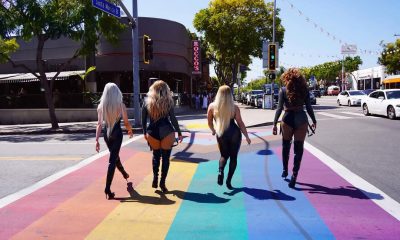
 Bars & Parties3 days ago
Bars & Parties3 days agoRocco’s 2.0 is looking to the past to celebrate the future
-

 Events2 days ago
Events2 days agoCelebrate Lesbian Visibility Week with The Curve Foundation
-

 Congress2 days ago
Congress2 days agoDemocratic lawmakers travel to El Salvador, demand information about gay Venezuelan asylum seeker
-

 Commentary3 days ago
Commentary3 days agoOn Pope Francis, Opus Dei and ongoing religious intolerance
-

 The Vatican4 days ago
The Vatican4 days agoPope Francis dies at 88









